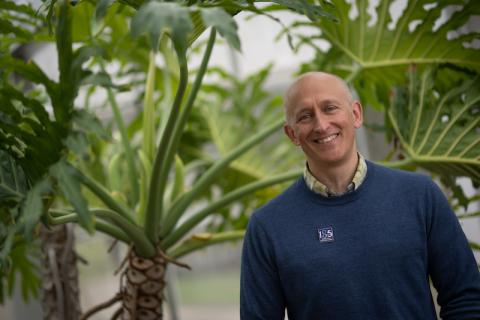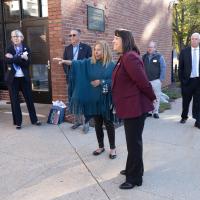
Professor Tim Parshall on the Importance of Understanding and Cultivating the Environment

Dr. Tim Parshall.
Dr. Tim Parshall, a professor at Westfield State University since 2004, initially joined the faculty as part of the biology department. Over the years, Dr. Parshall has witnessed and contributed to the remarkable growth and evolution of the University's environmental science department, which is now a popular and dynamic program with its own dedicated faculty members. Today, Dr. Parshall serves as a professor within this thriving department, which continues to grow in both academic offerings and student enrollment.
Environmental science, known for its interdisciplinary nature, tackles a range of pressing issues concerning our environment and human interaction with it. From wildlife and ecosystems to geology, chemistry, and water sciences, the discipline encompasses diverse themes essential for understanding and addressing environmental challenges. Dr. Parshall's expertise lies in forest ecology, complemented by fellow faculty members specializing in wildlife biology, water sciences, and restoration ecology.
In a recent interview, Dr. Parshall emphasized the urgency of environmental education, stating, "One of the most important things we should be understanding and learning about is the environment." He highlighted ongoing and emerging issues like water resource management and pollution, stressing the need for proactive solutions to avoid future consequences.
“Certainly in the next 50 years, we will have to figure out how people deal with environmental issues and problems as we have been for decades before this. There’s a lot of issues we need to address, like continued problems with water resources or pollution. We either have to figure out how to fix them, or we’ll have to deal with the consequences of not fixing them in the future.”
Dr. Parshall's passion for the outdoors and environmental education resonates deeply with his students, many of whom share his love for nature. He recalled his formative experiences in West Virginia, where he explored forests and developed a profound connection with the natural world. Inspired by a transformative environmental education camp during high school, Dr. Parshall chose to dedicate his career to teaching and inspiring others about environmental issues.
“That camp had a big impact on me and on understanding ecosystems and natural areas, and then teaching those things to other people,” he said. “Most of my schooling had to do with biology and ecology, so my background is in understanding those things. But I’ve always had an interest in at least thinking about environmental issues.”
For a time, Dr. Parshall thought to pursue full-time research, though his aptitude for a classroom setting diverted his original plans. “I wanted to teach a new generation of people to be aware of what’s going on and be able to contribute to our understanding of the world,” he added. “I remember that the coordinator of that camp said she was hoping she was planting seeds in all of us as counselors, so that we might continue the work of environmental education, and she definitely did with me.”
In the spirit of keeping that passion for the environmental alive, Dr. Parshall tends to this interest in his students. Environmental majors are able to access a variety of dynamic careers after graduating, such as the up and coming field of restoration ecology, which takes degraded ecosystems and then restores them back to healthy functioning.
Currently, Westfield State has the only program dedicated to restoration ecology. Other careers such as environmental consulting, wildlife biology and conservation, environmental police, and becoming a park ranger are available to those with environmental science degrees. Meanwhile, internships with West Springfield on developing and managing environmental properties in addition to working with nonprofit organizations that own land, prepare students for life after graduation.
“Westfield State is a great place to be a student of environmental science,” Dr. Parshall remarked. “Our faculty in the department have a focus on doing real-world teaching in the field. Our students get hands-on experience out in the forests, rivers, and streams through trips and classwork. I think our students appreciate that a lot of people learn better by doing, and since most of our work is outside, we’ve developed a way of getting students to work as a community with each other.”
This sense of community, not only with each other, but with the environment at large, is where the true magic happens. Dr. Parshall endorsed his fellow co-workers, as well as the University itself in helping to cultivate and define that relationship for the students. “We have a great relationship between faculty and students. I think that shows in the dedication our students have. They’re very passionate about this. They’re interested in making a contribution or difference in the world. It’s a way you can make that contribution and develop a career where you can do that.”


